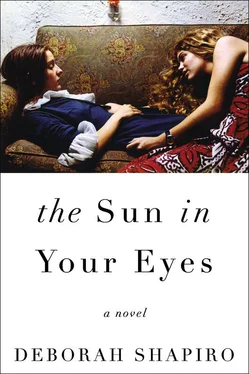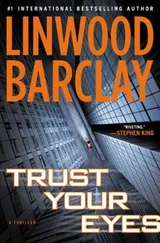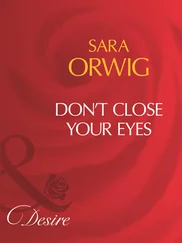They say it won’t last, that you’re too fast, but they don’t know, how you come and go. It was “Hey, Linda.” A song, presumably, for her mother. How did she do it? Lee wondered. Linda and her robust, industrious verve had mystified Lee for so long. She had tried to understand it, escape it, succumb to it, match it. But she had never thought to doubt it. It had occurred to her only lately, murkily at Flintwick’s and then more clearly coming into focus in the old widow’s walk where Carnahan kept those pictures of her father, that Linda’s relationship to her own past may not have been so tidy as it seemed. That her mother’s full-bodied, full-tilt charge ahead might be a defensive stance. An obfuscation of her history — obfuscation, yes, Lee had taken a class or two in college. A diversion. Eyes over here! Nothing to see that way. Move it along.
Ahead on the highway, she saw a billboard for a furniture store, the same one she’d seen years before, driving up and down this artery as an undergrad. The mustached trio of owner-brothers, their sectionals and dinettes, hadn’t changed. Soon enough, they were on local roads, the periphery of the campus, on the tree-lined street outside the university-owned Queen Anne where the dean of alumni relations and Linda’s former publicist lived. They parked, turning off the car stereo just before “Yours” (the song written for her, the one unambiguously lovely song on this troubled record) would have come on.
“The dean might not remember me,” said Lee. Solely for effect, what you say, even when you know people always remember you. “But it’s worth a shot. She’ll probably recall Linda’s generous donation in any case.”
A red door, a curving, decorative brass knocker, and then: “Lee Parrish! How are you? What are you doing here?” The dean, beckoning them into her parquet foyer, wearing a black dress and leopard-print heels, her dark hair smooth with a bouncy salon finish. Ready for a dinner-dance in Boston where she would deliver a version of the speech that almost always ended with her exhorting her audience to “Contribute!” Her catchphrase.
They had come at just the right time, the dean explained. A few days later and it would be graduation: “Absolute delirium!” They likely wouldn’t have caught her nor would she have had the chance to listen to Lee’s story about how they just happened to be in town ( old friends, road trip, girl time! ) and how Viv, a fellow alum and feverish workaholic, could really use access to the library while they were here. The dean thought nothing of making a phone call to grant them temporary entry cards. Even putting them up in a guest suite.
“Ladies, I’ve gotta run,” she said, putting on a jacket from Linda’s spring collection. “By the way, this pulls everything together. Your mother remains a genius.”
“That she does,” said Lee.
This place. It all came back to Lee quickly, though now it was like wandering through a life-size diorama. The brick buildings with slate shingled roofs, each lifted out of a period drama, the archways that opened onto the main green, gas lampposts, leafy trees dappling the spring sunlight. They passed a carriage house refashioned for academic offices and a classroom, where she recalled discussing (or rather, sitting silently and listening while other people discussed) Baudrillard. It had never occurred to her that this feeling is what that was about and she wondered whether she was always going to catch on fifteen years after the fact.
Their room for the night was in one of the newer dormitories, furnished with a sofa and club chairs upholstered in a dated gray, turquoise, and magenta fabric. It reminded Lee of a photo shoot in which she was told to hike up her pencil skirt, put one high-heeled foot on a similar chair, lean into the actor who sat there in a suit, and pull him toward her by his tie. The high-low tableau of beautiful people in expensive clothes on a set art-directed to look like an office park where you didn’t come to work so much as have anonymous sex. Which was perhaps a form of work itself. She had given them a range of expressions: hungry, playful, mirthless, I-know-better-than-you, Do-I-know-better-than-you? Pride-in-a-job-well-done, and Nice-tie. The end result looked a lot like I-am-very-hungry-and-I-would-like-to-eat-your-tie.
They dropped their bags and set out across campus for the humanities library. The white building with the 1960s punch-card façade hadn’t changed much — the bike racks and the brickwork sidewalks, the wide steps where she had first encountered Viv. But midcentury design had acquired a patina in the intervening years. Instead of seeming, as it once had, slightly dingy and outdated, it now seemed like a place with history. Which brought her own history back to her. It seemed to Lee as if she had watched the scene in a movie: two girls sitting out here one afternoon, one of them getting up and running away. Power-walking away. The way you can watch yourself in a dream. It was only a dreamlike logic that allowed her to make sense of the fact that she was standing here right now.
Across the street stood the tall, wrought iron gate that was opened twice a year, once for a snaking formation of nervous freshmen to pass through on their way to the main green for convocation and once for only slightly less self-conscious seniors to walk out of during commencement. In a few days, it would be time for that second ceremony. She had a vague memory of lining up to move through the gate as a freshman, meeting a group of friendly students who invited her to join them for a meal-plan dinner later. She did, and it was pleasant and they had a few laughs, but then they never saw much of one another after that. She didn’t see some of them again until four years later, when Andy graduated and she and Viv still had a few semesters to go. They acknowledged each other on the green with minor smiles, as if to say, “That was you, right? Well. Good luck with the rest of your life!” Viv asked her in a politely lowered voice who those people were and she replied, “I never really knew.”
How arbitrary it could all be. If she had gone to a different school. If she had never met Viv. If she had never met Andy. New York, after she had been away from it, often conjured Viv for her: the sun in the summer and the way it could cast a quietness over the streets, the subway lines that took you above ground, over the river or out to the beach. This place now started to seem less of a simulation of itself and began to conjure Andy.
Sometimes when Lee thought about Andy, she thought of the way Linda and Jesse described meeting each other: an instant attraction in a kitchen at a party. With Andy it wasn’t exactly attraction but something similar. He was so easy to talk to. He reminded her a little of Alex Garcia, who would skip sixth period in high school to go lie with her on the floor of her bedroom and look up at the ceiling, the stereo on, saying whatever came into their heads. That Alex turned out to be gay didn’t really surprise her. Isn’t that, in a way, what had probably drawn her to him? She wondered about Andy. He didn’t express an immediate, sexual interest in girls, but he didn’t express much of an interest in guys, and she initially figured it wasn’t that he was gay but that he was so into music, to an extreme, maybe to the exclusion of sex, with anyone.
A week or so into college, she heard Motel Television coming from his room, like a flare in the distance: over here. She thought about turning back down the hall. If she knocked and went in right then, she would have to tell him. It would be weird not to. But who knew how that would change things? She had recently begun to think about her father, about being her father’s daughter, the way she thought about her looks. For much of her childhood, she hadn’t thought all that much about either, she had just accepted that her life contained certain facts: her late father was Jesse Parrish and she was pretty. Linda sent her to a progressive private school where a majority of her classmates were the sons and daughters of famous people. She never felt particularly exceptional in that respect. While she knew that the way she looked gave her certain advantages, she had taken it for granted. She hadn’t tried to manage or manipulate her beauty until she became aware that it had an effect on other people. It compelled them and sometimes alienated them and sometimes confused them. It could do all of that to her, as well. Like with Roy, when she was fifteen, when her legs were still a little too long for the rest of her body but her breasts were balancing it all out. Roy was what then? Linda’s good friend, industry event date, and occasional lover? He was around a lot, in any case. And Lee, from the age of ten, when Linda first started seeing him, had liked him. He joked with her in a way that Linda never did, called her Robert E. or the General. General Store. General Vicinity. General Ization. And he lived on a ranch where he had chickens, horses, a llama or two, and even, briefly, a donkey he named Steven Bochco, after his one-time professional rival. She couldn’t recall Linda ever being very involved with her school projects, but Roy knew what cuneiform script was and seemed genuinely interested in her report on ancient Sumer. He also once helped her construct, out of cardboard and cushioning balloons, a container that would protect an egg and keep it from cracking when dropped from a second-story window. All this changed the summer after she started high school. He still used those nicknames, but they had become clunky. Now they were reminders, souvenirs of an easier time, a time before she felt him looking at her and then quickly looking away when her eyes met his. Roy never made a pass at her, thankfully, but his restraint (never in doubt, yet never wholly without effort) left her self-conscious. She lost him, in a way, and she lost some remaining part of her innocence. There were, of course, other men who came into Linda’s life without Roy’s restraint. But by then she knew to expect it.
Читать дальше












